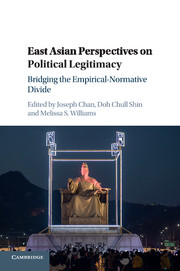Book contents
- Frontmatter
- Contents
- List of Contributors
- Preface and Acknowledgments
- 1 Political Legitimacy in East Asia: Bridging Normative and Empirical Analysis
- 2 Reasons to Obey: “Multiple Modernities” and Constructions of Political Legitimacy
- 3 Do East Asian States Enjoy a Legitimacy Premium?
- 4 Political Legitimacy in China: A Confucian Approach
- 5 Political Legitimacy in Hong Kong: A Hybrid Notion
- 6 The Evolution of Political Legitimacy in Singapore: Electoral Institutions, Governmental Performance, Moral Authority, and Meritocracy
- 7 Polarized Politics, Government Legitimacy, and Democratic Legitimacy in Taiwan
- 8 The Legitimacy of Democratic Rule in Korea: From the Perspective of the Mass Citizenry
- 9 Political Legitimacy, Satisfaction, and Japanese Democracy
- 10 Legitimacy as a Hybrid Phenomenon
- Index
Preface and Acknowledgments
Published online by Cambridge University Press: 30 December 2016
- Frontmatter
- Contents
- List of Contributors
- Preface and Acknowledgments
- 1 Political Legitimacy in East Asia: Bridging Normative and Empirical Analysis
- 2 Reasons to Obey: “Multiple Modernities” and Constructions of Political Legitimacy
- 3 Do East Asian States Enjoy a Legitimacy Premium?
- 4 Political Legitimacy in China: A Confucian Approach
- 5 Political Legitimacy in Hong Kong: A Hybrid Notion
- 6 The Evolution of Political Legitimacy in Singapore: Electoral Institutions, Governmental Performance, Moral Authority, and Meritocracy
- 7 Polarized Politics, Government Legitimacy, and Democratic Legitimacy in Taiwan
- 8 The Legitimacy of Democratic Rule in Korea: From the Perspective of the Mass Citizenry
- 9 Political Legitimacy, Satisfaction, and Japanese Democracy
- 10 Legitimacy as a Hybrid Phenomenon
- Index
Summary
This volume grows out of a multiyear international research collaboration, East Asian Perspectives on Politics, whose broad purpose is to help advance the emerging field of comparative political theory. Our aim, like that of the growing number of scholars working on non-Western political thought, is to “deparochialize political theory,” that is, to decenter European traditions of thought in defining the parameters of our field. The project on East Asian Perspectives on Politics proceeded through a series of six workshops, held between 2010 and 2012, at leading universities in East Asia and Canada: Fudan University, the National University of Singapore, Seoul National University, the University of Hong Kong, Keio University, and the University of Victoria. The project has also received significant institutional support from the Centre for Ethics at the University of Toronto and the Peter Wall Institute at the University of British Columbia.
The project would not have been possible without the generous financial support and visionary leadership of the Shibusawa Ei'ichi Memorial Foundation, based in Tokyo, Japan. It is exceedingly rare for research foundations to take a chance on a research field that has not yet garnered widespread recognition in the academy. Comparative political theory has come into common parlance in the past several years, and a small but growing number of universities have designated the field as a target for faculty recruitment. But the field was barely on the horizon in 2005, when the Shibusawa Foundation sponsored a special panel on cross-cultural political thought at a colloquium at the University of Toronto. We are deeply indebted to the foundation, and in particular to its president, Masahide Shibusawa; its managing director, Jun'etsu Komatsu; and its research director, Masato Kimura.
We also owe an enormous debt of gratitude to the Social Sciences and Humanities Research Council of Canada for significant financial support for this project. This support not only made it possible to involve many Canadian scholars in the project but also to foster the work of talented younger scholars through the graduate workshops that accompanied each conference.
Thanks to the encouragement and sage guidance of Dr. Kimura, the initial panel discussion in Toronto led to a series of planning workshops for a more ambitious research collaboration.
- Type
- Chapter
- Information
- East Asian Perspectives on Political LegitimacyBridging the Empirical-Normative Divide, pp. ix - xiiPublisher: Cambridge University PressPrint publication year: 2016

